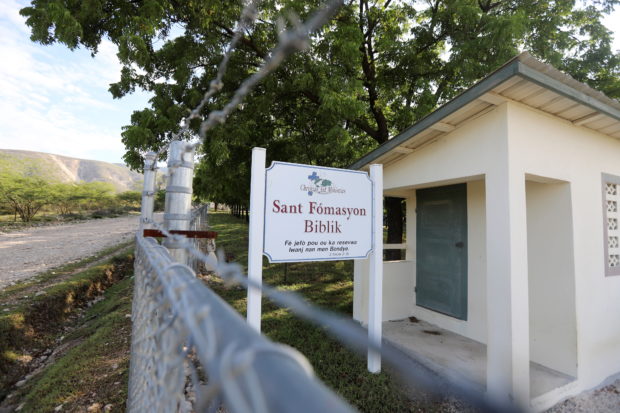
FILE PHOTO: A sign reading “Bible Training Centre, Strive to receive praise from God” is seen at the Christian Aid Ministries compound after the abduction of a U.S.-based group of missionaries fueled international concerns over gang violence, in Titanyen, on the outskirts of Port-au-Prince, Haiti October 18, 2021. REUTERS/Ralph Tedy Erol
PORT-AU-PRINCE — A Haitian man asserting that he represents a gang that kidnapped a group of American and Canadian missionaries said in a video posted on YouTube on Thursday that he is willing to kill “these Americans” if he does not get what he needs.
The speaker in the video, dressed in a purple suit, is identifiable as the man known in Haiti by the alias Lamo Sanjou, the leader of the 400 Mawozo gang.
Reuters was unable to independently confirm the veracity of the video or when it was made. It shows the man speaking in the street and surrounded by other, unidentified men. The missionaries were not present.
“If I don’t find what I need, these Americans, I’d rather kill them all, and I’ll unload a big gun in the head of each of them,” said the man.
A Haitian police spokesperson did not immediately respond to a Reuters request for comment.
The 400 Mawozo began as small-time local thieves and rose to become one of Haiti’s most feared gangs that controls a rural area east of the capital Port-au-Prince, according to security experts.
Justice Minister Liszt Quitel told Reuters this week that the kidnappers were seeking $17 million for the release of the missionaries, who were abducted on a trip organized by Ohio-based Christian Aid Ministries.
Their seizure has focused global attention on Haiti’s dire kidnapping problem, which has worsened amid economic and political crises in the Caribbean nation.
Local media outlet Le Nouvelliste on Thursday reported that Haitian Police Chief Leon Charles has resigned, citing comments by Prime Minister Ariel Henry.
Separately, demonstrators on Thursday blocked streets of Port-au-Prince with rocks and tree branches and burned tires to protest widespread fuel shortages.
Haitian truckers had initially planned a strike to protest the shortages, but Thursday’s demonstrations were largely led by motorcycle drivers angry that they could not work for lack of fuel.
Authorities also recently prohibited the sale of fuel in five-gallon containers, which has traditionally served as a mechanism for finding gasoline during shortages.
Drivers wound through the side streets of the capital on Thursday, often forced to turn around after coming across barricades. Others argued and bargained with the protesters in an attempt to let them pass.
Anger over a weakening currency, double-digit inflation, soaring crime, and graft accusations lodged against public officials have sparked violent, sometimes deadly, protests.

